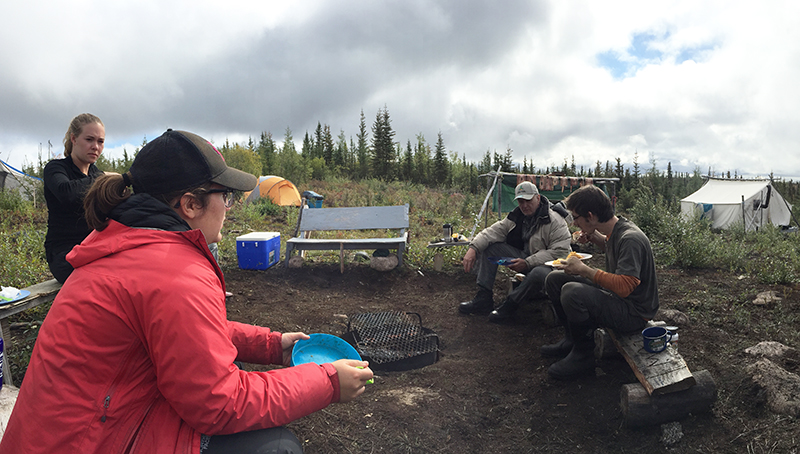One of the key issues that researchers face is how to make their work accessible to everyday people. Alison Blay-Palmer has found a way.
“Food is something that everybody understands. It’s an entry point for change,” says Blay-Palmer, professor of Geography and Environmental Studies. “I’m hard pressed to find a problem I can’t solve with food because it’s so foundational to our daily lives.”
In a world where 37 per cent of greenhouse gas emissions are caused by global food systems and more than 820 million people are food insecure, food is at the root of many complex global challenges. Put simply, “We have enough food to feed everyone. What we need to work on is how to get food to the people who need it while also protecting biodiversity and dealing with climate change,” says Blay-Palmer.
Blay-Palmer is the founding director of the Laurier Centre for Sustainable Food Systems (LCSFS) and the lead researcher of the Food: Locally Embedded, Globally Engaged (FLEdGE) partnership, as well as a member of the School of International Policy and Governance at the Balsillie School of International Affairs.
"I’m hard pressed to find a problem I can’t solve with food because it’s so foundational to our daily lives,” says Laurier’s Alison Blay-Palmer, UNESCO Chair on Food, Biodiversity and Sustainability Studies.
As the issues she studies become increasingly urgent, Blay-Palmer’s work has received a major international endorsement: she was recently named United Nations Educational, Scientific and Cultural Organization (UNESCO) Chair on Food, Biodiversity and Sustainability Studies.
Led in Canada by the Canadian Commission for UNESCO, the prestigious UNESCO Chairs program promotes international inter-university cooperation in key priority areas for UNESCO. The program involves more than 781 institutions in 116 countries. Blay-Palmer is only the fourth Ontario scholar to be named as a chair in the program.
“Professor Blay-Palmer is already recognized as a national leader in food sustainability research,” says Jonathan Newman, Laurier’s vice-president: research. “Being a UNESCO Chair will help her make a global impact, ultimately helping build a more environmentally, socially and economically sustainable food system for the whole planet.”
– Jonathan Newman
With the enhanced profile of the UNESCO Chair, Blay-Palmer will continue to lead research teams and establish partnerships that are international in scope. She and her colleagues are currently involved in food-systems research around the world, from Berlin to Kenya to the Northwest Territories.
In Brazil, the LCSFS is working with local, national and international collaborators to create a knowledge-sharing network among small-scale family farmers. Farmers learn from each other at field schools in the forest, where they develop agroecological practices related to the conservation of soils, biodiversity and water. Based on traditional systems, this information is allowing farmers to maintain sustainable production in the face of climate change.
Similarly, Blay-Palmer’s colleague Edward Shizha, professor of Society, Culture and Environment, is collaborating with peers at the University of Zimbabwe to conduct research that integrates Indigenous and community knowledge systems into school curricula. The goal is to promote inter-generational knowledge exchange around food production.
“This is really important, as research shows that ecosystems and biodiversity are much better protected when local communities are involved and their Indigenous knowledge systems are validated and legitimized,” says Blay-Palmer.
She highlights the work that Andrew Spring, associate director of the LCSFS, is undertaking with Indigenous communities in the Northwest Territories to mitigate the effects of climate change as another example of this model.
“One of the ways this work happens is through on-the-land camps where youth have the opportunity to learn about traditional food systems directly from elders,” says Blay-Palmer.
In her local community, Blay-Palmer’s team has been working with Alternative Land Use Services (ALUS) Canada to promote agricultural stewardship. The organization invests in farmers and ranchers who commit to sustaining agriculture, wildlife habitat and natural spaces for all Canadians. To date, the ALUS program has been adopted by nearly 1,000 family farms, encompassing 25,000 acres in six provinces.

Andrew Spring, a member of Alison Blay-Palmer’s team at the Laurier Centre for Sustainable Food Systems, helps organize on-the-land camps in the Northwest Territories, where youth learn about traditional food systems directly from Indigenous elders.
Much of Blay-Palmer’s work as a UNESCO Chair will be focused on creating solutions with broad applications and sharing them widely through innovative means, such as podcasting and online community portals. Blay-Palmer has partnered with the UN Food and Agriculture Organization to create a free digital toolkit for cities and regions to assess and improve local food systems, from production to consumption to waste, all while supporting stakeholders.
“If you talk to people in the Northwest Territories or you talk to people in Kenya, they are all grappling with the impacts of climate change,” says Blay-Palmer. “How that change manifests itself in local communities is different, but everybody is facing the same challenges. So what we do is try to provide a suite of tools and resources that communities can choose from to help them develop more place-based and sustainable food systems.”
Despite mounting pressure to fix broken food systems, Blay-Palmer considers herself a “possible-ist” and believes society has the tools needed at its disposal. She says being appointed a UNESCO Chair has made her more committed than ever to creating long-term change.
“We now have more resources, goodwill and connections, along with the support of UNESCO, one of the most important global institutions,” says Blay-Palmer. “This is important as we contribute to solutions.”